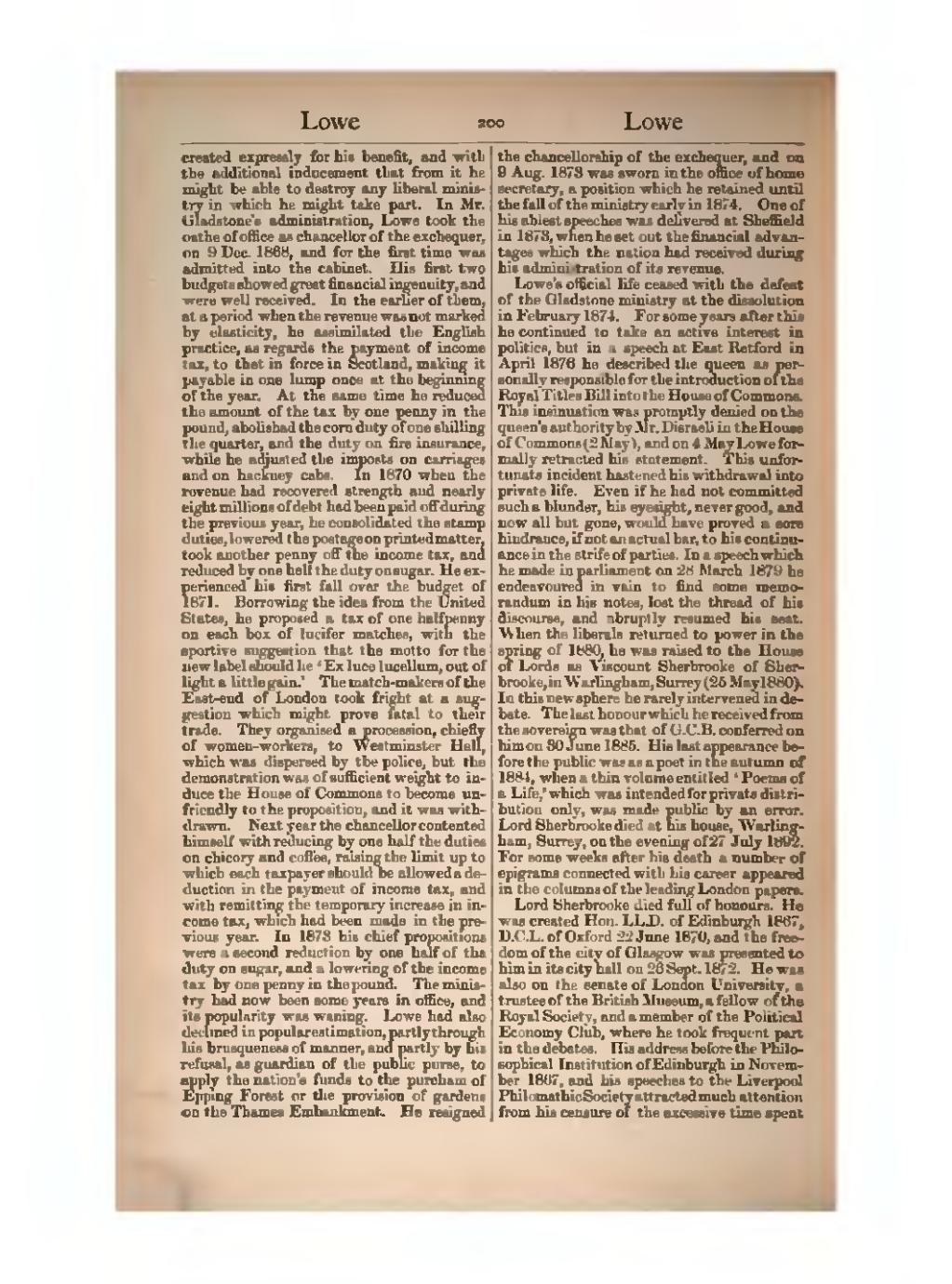created expressly for his benefit, and with the additional inducement that from it he might be able to destroy any liberal ministry in which he might take part. In Mr. Gladstone's administration, Lowe took the oaths of office as chancellor of the exchequer, on 9 Dec. 1868, and for the first time was admitted into the cabinet. His first two budgets showed great financial ingenuity, and were well received. In the earlier of them, at a period when the revenue was not marked by elasticity, he assimilated the English practice, as regards the payment of income tax, to that in force in Scotland, making it payable in one lump once at the beginning of the year. At the same time he reduced the amount of the tax by one penny in the pound, abolished the corn duty of one shilling the quarter, and the duty on fire insurance, while he adjusted the imposts on carriages and on hackney cabs. In 1870 when the revenue had recovered strength and nearly eight millions of debt had been paid off during the previous year, he consolidated the stamp duties, lowered the postage on printed matter, took another penny off the income tax, and reduced by one half the duty on sugar. He experienced his first fall over the budget of 1871. Borrowing the idea from the United States, he proposed a tax of one halfpenny on each box of lucifer matches, with the sportive suggestion that the motto for the new label should be ‘Ex luce lucellum, out of light a little gain.’ The match-makers of the East-end of London took fright at a suggestion which might prove fatal to their trade. They organised a procession, chiefly of women-workers, to Westminster Hall, which was dispersed by the police, but the demonstration was of sufficient weight to induce the House of Commons to become unfriendly to the proposition, and it was withdrawn. Next year the chancellor contented himself with reducing by one half the duties on chicory and coffee, raising the limit up to which each taxpayer should be allowed a deduction in the payment of income tax, and with remitting the temporary increase in income tax, which had been made in the previous year. In 1873 his chief propositions were a second reduction by one half of the duty on sugar, and a lowering of the income tax by one penny in the pound. The ministry had now been some years in office, and its popularity was waning. Lowe had also declined in popular estimation, partly through his brusqueness of manner, and partly by his refusal, as guardian of the public purse, to apply the nation's funds to the purchase of Epping Forest or the provision of gardens on the Thames Embankment. He resigned the chancellorship of the exchequer, and on 9 Aug. 1873 was sworn in the office of home secretary, a position which he retained until the fall of the ministry early in 1874. One of his ablest speeches was delivered at Sheffield in 1873, when he set out the financial advantages which the nation had received during his administration of its revenue.
Lowe's official life ceased with the defeat of the Gladstone ministry at the dissolution in February 1874. For some years after this he continued to take an active interest in politics, but in a speech at East Retford in April 1876 he described the queen as personally responsible for the introduction of the Royal Titles Bill into the House of Commons. This insinuation was promptly denied on the queen's authority by Mr. Disraeli in the House of Commons (2 May), and on 4 May Lowe formally retracted his statement. This unfortunate incident hastened his withdrawal into private life. Even if he had not committed such a blunder, his eyesight, never good, and now all but gone, would have proved a sore hindrance, if not an actual bar, to his continuance in the strife of parties. In a speech which he made in parliament on 28 March 1879 he endeavoured in vain to find some memorandum in his notes, lost the thread of his discourse, and abruptly resumed his seat. When the liberals returned to power in the spring of 1880, he was raised to the House of Lords as Viscount Sherbrooke of Sherbrooke, in Warlingham, Surrey (25 May 1880). In this new sphere he rarely intervened in debate. The last honour which he received from the sovereign was that of G.C.B. conferred on him on 30 June 1885. His last appearance before the public was as a poet in the autumn of 1884, when a thin volume entitled ‘Poems of a Life,’ which was intended for private distribution only, was made public by an error. Lord Sherbrooke died at his house, Warlingham, Surrey, on the evening of 27 July 1892. For some weeks after his death a number of epigrams connected with his career appeared in the columns of the leading London papers.
Lord Sherbrooke died full of honours. He was created Hon. LL.D. of Edinburgh 1867, D.C.L. of Oxford 22 June 1870, and the freedom of the city of Glasgow was presented to him in its city hall on 26 Sept. 1872. He was also on the senate of London University, a trustee of the British Museum, a fellow of the Royal Society, and a member of the Political Economy Club, where he took frequent part in the debates. His address before the Philosophical Institution of Edinburgh in November 1867, and his speeches to the Liverpool Philomathic Society attracted much attention from his censure of the excessive time spent
